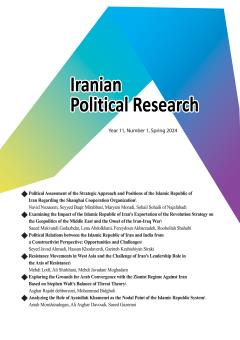Political Assessment of the Strategic Approach and Positions of the Islamic Republic of Iran Regarding the Shanghai Cooperation Organization
Subject Areas : Iranian Political Research
Navid Nozaeem
1
![]() ,
Seyyed Baqir Mirabbasi
2
*
,
Mareyam Moradi
3
,
Sohail Sohaili Najafabadi
4
,
Seyyed Baqir Mirabbasi
2
*
,
Mareyam Moradi
3
,
Sohail Sohaili Najafabadi
4
1 - PhD Student, Department of Public International Law, Qeshm Branch, Islamic Azad University, Qeshm, Iran
2 - Associate Professor, Faculty of Law and Political Science, University of Tehran, Tehran, Iran
3 - Assistant Professor, Department of Law, Qeshm Branch, Islamic Azad University, Qeshm, Iran
4 - Assistant Professor, Department of Public International Law, Qeshm Branch, Islamic Azad University, Qeshm, Iran
Keywords: Islamic Republic of Iran, Shanghai Cooperation Organization, international organizations, foreign relations, foreign policy, China, United States,
Abstract :
The objective of this research is to politically assess the strategic approach and positions of the Islamic Republic of Iran concerning the Shanghai Cooperation Organization (SCO). The research method is descriptive-analytical, and the findings indicate that the mutual interests of Iran and the two major powers within the SCO, Russia, and China, in preventing American influence in Southwest Asia, particularly Central Asia, have brought them closer together within the framework of bilateral relations and also within the SCO. To counter American hegemony at the regional level and ensure its national interests against the security threats posed by the United States, the Islamic Republic of Iran has taken steps towards permanent membership in the SCO. Permanent membership in the SCO has provided structural opportunities for Iran, which, on one hand, can create a balance against American hegemony in the region with the support of the powers within this structure, and on the other hand, enhances Iran's political and security status in Central Asian equations and Middle Eastern developments. Therefore, with the aforementioned high capacities in the Middle East region, Iran has the necessary strategic capability to become a regional power.
انوری، حمیدرضا؛ رحمانی موحد، مرتضی (1388). سازمان همکاری شانگهای چشماندازی به سوی جهان چندقطبی. تهران: مرکز چاپ و انتشارات وزارت امورخارجه، چاپ دوم.
بدیعی ازنداهی، مرجان؛ شریفی رضوی، مجید؛ میراحمدی، فاطمه سادات (1393). بازتابهای جهانی شدن سیاسی بر سازمان همکاری شانگهای. تحقیقات کاربردی علوم جغرافیایی، شماره 32.
بزرگی، وحید؛ حسینی، میرعبدالله (1390). سازمان همکاری شانگهای؛ تحولات گذشته و چشمانداز آینده. مطالعات اوراسیای مرکزی، 3(1).
حاجییوسفی، امیرمحمد (1384). سیاست خارجی جمهوری اسلامی ایران در پرتو تحولات منطقهای. دفتر مطالعات سیاسی و بینالملل وزارت امورخارجه، چاپ دوم.
حاجییوسفی، امیرمحمد؛ ساداتالوند، مرضیه (1387). ایران و سازمان همکاری شانگهای: هژمونی و ضدهژمونی. پژوهشنامه علوم سیاسی، 3(6).
دهقانی فیروزآبادی، سید جلالالدین (1385). گفتمانهای سیاست خارجی ایران در آسیای مرکزی و قفقاز، ایران. مطالعات روسیه، آسیای مرکزی و قفقاز، 1(2).
رضایی، علیرضا؛ صالحی، عباس (1390). سازمان همکاری شانگهای و عضویت دائم جمهوری اسلامی ایران. مطالعات سیاسی، 3(9).
سنایی، مهدی (1390). روابط ایران و آسیای مرکزی: روندها و چشماندازها. تهران: مرکز چاپ و انتشارات وزارت امور خارجه.
شیبانی، اعظم؛ عطایی، فرهاد (1390). زمینههای همکاری و رقابت ایران و روسیه در آسیای مرکزی در چارچوب ژئوپلیتیک. مطالعات اوراسیای مرکزی، 4(8).
طباطبایی، سید علی (1390). بررسی تطبیقی رویکرد راهبردی چین، روسیه، آمریکا، هند، پاکستان و ایران به سازمان همکاری شانگهای. راهبرد، 20(24).
عزتی، عزتالله؛ یزدانپناه درو، کیومرث (1386). تحلیلی بر ژئوپلیتیک پیمان اقتصادی- امنیتی شانگهای با تاکید بر چشمانداز عضویت ایران در این سازمان. ژئوپلیتیک، 3(3).
کلینی، فرهاد (1385). نحوه تعامل با کشورهای منطقه (آسیای میانه، قفقاز، خاورمیانه، کشورهای همسایه در فرآیند اجرای سند چشمانداز). در: مجموعه مقالات همایش ملی سند چشمانداز. تهران: مؤسسه آموزش عالی، آموزش و پژوهش مدیریت و برنامهریزی، ج4.
کوزهگر کالجی، ولی (1394). رویکرد و ملاحظات جمهوری خلق چین در قبال عضویت ایران در سازمان همکاری شانگهای. در: چشمانداز روابط ایران و چین. تهران: موسسه فرهنگی مطالعات و تحقیقات بینالمللی ابرار معاصر، ص244-213.
موسوی، سید محمدعلی؛ اسفندیار، خدایی (1392). ایران و عضویت در سازمان همکاری شانگهای. نگاه ایرانی روابط خارجی (ایرفا)، 4(13)، ص210-185.
واتسون، گرگ (1385). سازمان همکاری شانگهای امنیت ایران در قرن بیست و یکم. مطالعات آسیای مرکزی و قفقاز، 15(55).
واعظی، محمود (1390). تحولات سازمان همکاری شانگهای: اهداف و منافع بنیانگذاران. پژوهشنامه سیاست خارجی، شماره 3.
واعظی، محمود (1385). سازمان همكاری شانگهای و ایران؛ نگاه دراز مدت. همشهری دیپلماتیك، شماره3.
هنسن، برت؛ تافت، پتر؛ ویول، آندره (1390). راهبردهای امنیتی و نظم جهانی امریکایی «قدرت از دست رفته». ترجمه: امیر نیاکوئی و احمد جانسیز، انتشارات دانشگاه گیلان.
الهی دهقی، ایرج؛ جمشیدی، محمد (1393). ارائه الگوی تحلیلی محیط راهبردی سیاست خارجی جمهوری اسلامی ایران؛ مطالعه موردی منطقه آسیای مرکزی. آسیای مرکزی و قفقاز، شماره 86.
یزدانی، عنایتالله؛ حسینی، محمدحسین (1394). تاثیر قدرت هوشمند بازیگران سازمان همکاری شانگهای و بریکس بر دینامیك سیکل قدرت. آسیای مرکزی و قفقاز، شماره 92.
Brummer, M. (2007). The Shanghai Cooperation Organization and Iran: a Power-Full Union. Journal of International Affairs, Vol. 60.
Charter of the Shanghai Cooperation Organization (2015).
URL= https://cis-legislation.com/document.fwx?rgn=3851
Clark, I. (2012). China and the United States: a succession of hegemonies? International Affairs, 87(1), p. 14-28.
Cox, M. (2012). Power Shifts, Economic Change and the Decline of the West? International Relations Journal, 26(4), p. 369-388.
Eurasian Economic Union - Viet Nam FTA (2015). URL= https://investmentpolicy.unctad.org/international-investment-agreements/treaties/treaties-with-investment-provisions/3573/eurasian-economic-union---viet-nam-fta-2015-
Ganguly, S. (2012). Nuclear Stability in South Asia. International Security, 33(2), p. 102-145.
Godwin, P. (2014). China as Regional Hegemon? In: Jim Rolfe (ed.), The Asia-Pacific in Transition, (Honolulu: Asia-Pacific Center for Security Studies).
Harvey, D. (2005). The New Imperialism. Oxford University Press.
Hoogvelt, A. (2007). Globalization and the Postcolonial World: The New Political Economy of Development. Baltimore: Johns Hopkins University Press.
Hu, F.Y. (2013). The Shanghai Cooperation Organization (SCO): Pro-spects and Problems in Russia-China Relations. Journalism and Mass Commu-nications, 3(2), p. 101-113.
Rumer, B. (2006). The Powers in Central Asia. Survival, 44(3).
Sheila, P. (2000). Regionalism among Developing Countries. London: Macmillan Press LTD.
Stobdan, P. (2016). India’s Balancing Role in the Central Asian Power Game. Institute for Defence Studiet and Analyses.
Yardımcıoğlu, M. (2012). Çok Kutuplu Dünyaya Doğru: ŞİÖ. Dergi Park Akademik, 2(2).

